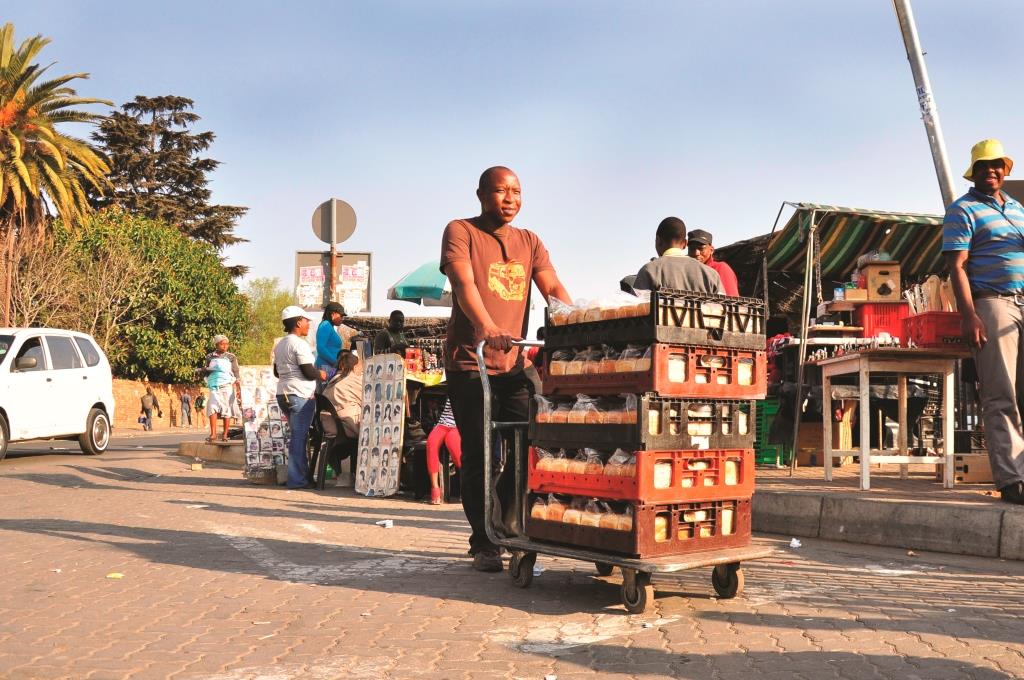Johannesburg entrepreneur Chris Pienaar was hungry for profits and it was bread which fed this hunger. He set up Straight to Your Door bread deliveries in Alexandra—one of Johannesburg’s oldest townships, which is affectionately referred to as ‘Alex’—more than two years ago. He started out with just R20 ($2.40) to buy stock and made a R2 ($0.24) profit on his first sale. In July, those numbers grew to around R23,000 ($2,756).
“In Alex people can wait up to 40 minutes in supermarket queues just to buy fresh bread every day. That’s when I realized bringing bread to people’s doors would be something Alex residents would be happy to pay for,” he says.
But closing this gap and turning it into a business opportunity only became a reality when Pienaar joined forces with the Awethu Project, an entrepreneurs’ incubation program based at Constitution Hill.
Awethu, meaning ‘ours’ in Nguni languages, was launched by Yusuf Randera-Rees, a Harvard and Oxford graduate, who cut his teeth working for a Swiss bank and returned to South Africa in 2009. His objective was to merge his Harvard training and insights with the entrepreneurial potential of South Africa’s townships. He wasn’t out to establish a charity but a business model that would see entrepreneurs and Awethu’s partners make mutual profits. Entrepreneurs have to give half of their new profits to Awethu.
“At Harvard and Oxford I saw an almost proven record of success but it wasn’t necessarily because the students were all exceptional,” says Randera-Rees.
What was exceptional, Randera-Rees noted, was that his peers had access to quality education, mentors, infrastructure and the halo effect of being associated with the world’s most respected business schools.
“I was angry that so much entrepreneurial potential in South Africa was being wasted just because people didn’t have access to opportunities.”

By 2010, Randera-Rees had secured corporate sponsorship, funding from treasury’s job fund, staff members and a heavyweight list of patrons and advisory board members. He could pilot the project, which he and university friend Ryan Parker had first conceived as Oxford students when they entered the university’s 21st Century Challenge. The winning social-entrepreneurship projects had to be sustainable, show financial returns and produce social and environmental benefits. The pair’s business incubation idea got top 10 spot in the competition.
Pienaar joined the first Awethu workshop held in Alexandra and the match was obvious from the start.
“Chris was great at every problem solving exercise we gave to the entrepreneurs. And when he did undergo the testing process we had devised he scored in the top percentages of anyone in the world,” says Randera-Rees.
Pienaar, who was a less-than-successful beer seller when he joined the workshop, recognized Awethu’s fresh take on hackneyed buzz phrases of job creation and poverty alleviation.
“This was about getting practical business training, partnering with Awethu to use their networks and then having the guts and initiative to make it happen,” he says.
It is about steady growth and making real profits that also factor in Awethu’s cut. It’s not a get-rich-quick scheme. That is why Awethu’s key to success is to select the right entrepreneurs with which to partner.
Over the next 18 months they aim to have 1,000 thriving entrepreneurs. It all begins with the workshops, which aim to reach around 13,000 entrepreneurs who will be provided with a free two hour business course. Applicants don’t need a minimum level of education, business experience or capital. Like Pienaar, they don’t even need an investable idea. They only need to come from an underprivileged background and prove, after the workshop and testing process, that they have what it takes to become entrepreneurs. From the 13,000 a core group of 1,000 will be identified to partner with Awethu’s mentors to start on the incubation process.
Pienaar has become a mentor and trainer himself. He says his success disproves that township youth are doomed to fail. Straight To Your Door works because he understands his market and his customers’ needs. It makes money because the ideas are polished by mentors; have the confidence of acquired business skills and the thumbs up from those who are part of powerful business networks. Pienaar has not stopped doing the grunt work and he is constantly adapting the responsiveness of his business strategies.
“I know me and I know Alexandra. The bread deliveries work because we’re doing them in the afternoon when people are at home, not rushing around and trying to find change to pay. We can also do deliveries quickly because the homes are close together and this means you save time, you keep your customers happy and so you can sell more bread and make more profit,” he says.
Today, Pienaar has six employees and is looking to partner with other entrepreneurs who want to sell door to door. He’s been able to piggyback on Awethu to seal significant deals with large established brands that now recognize his successful track record.
“My granny is so proud of me. She sold fatcakes for a living but we lived from hand-to-mouth, now I’m a person who gets respect and people come to for business advice,” says Pienaar.
Randera-Rees is also proud. Pienaar is exactly the kind of success story Awethu needs to reach their target of 1,000 ace entrepreneurs and to prove the strange but beautiful alchemy that can happen when Harvard and ‘Alex’ meet.
